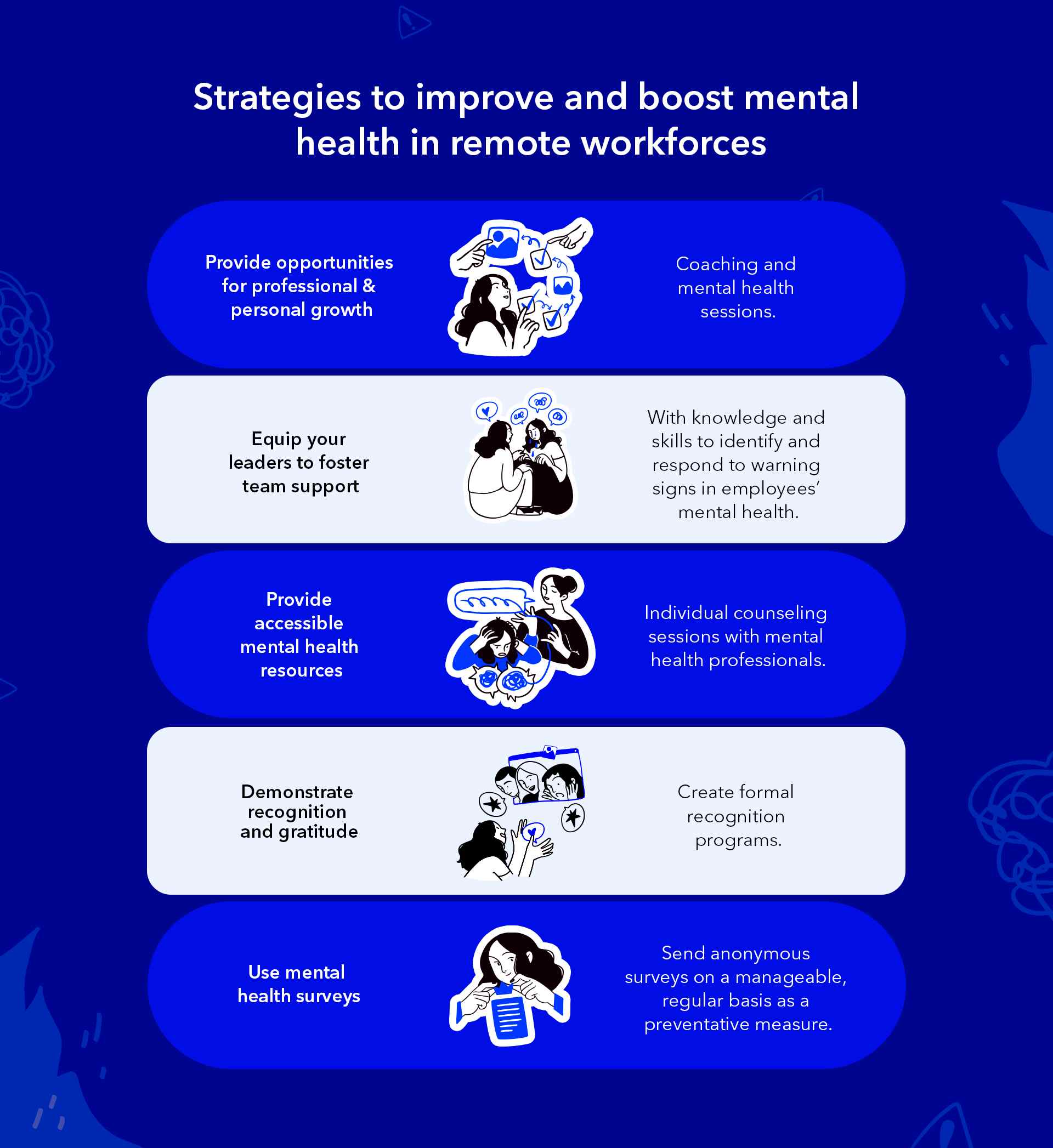Thanks to technology, remote work is becoming the norm, reinventing our understanding of a 'workplace'. Yet, this work format comes with its own challenges, particularly in addressing the employee's mental health - a critical aspect often overlooked in this setup.
In recognition of International Mental Health Awareness Day on October 10, we emphasize the importance of mental well-being. As society's understanding and acceptance of mental health issues increase, it is crucial that we integrate relevant strategies into all facets of life, particularly in the virtual work environment.
The state of mind of your employees directly influences:
- Their productivity and performance at work.
- Their level of interest and involvement in their tasks.
- Their interactions and teamwork with colleagues.
- Their capacity to stay focused and avoid distractions.
- Their ability to accept adjustments and respond to change effectively.
Consequently, issues such as depression and anxiety within a professional environment are reckoned to contribute a staggering $1 trillion yearly in lost productivity.
As empathetic professionals who lead employees’ well-being in organizations, the challenge, and responsibility to build strategies towards a mentally healthy remote work environment lie with us — it's an opportunity for us to establish the foundation for an inclusive, thriving, and balanced remote workforce.
This article is meant to provide meaningful approaches to help lead the way in cultivating positive mental health within remote teams.

1. Provide opportunities for professional and personal growth
Empowering personal development can not only catalyze your employees' well-being, but it can also fuel their career progression, nurturing a sense of loyalty within them.
Dedicating time for coaching and mental health sessions provides your team with the tools they need for their personal and professional goals. They learn how to balance work with everyday life, manage stress, streamline workflow, and maintain overall wellness.
Investing in your remote employees' mental health and growth cultivates not just individual well-being, but an engaged, productive, and robust workforce. This lays the foundation of a thriving workplace.
2. Equip your employees with accessible mental health resources
Getting access to mental health care can feel a bit like an uphill battle sometimes, especially when financial concerns come into play. That's why, as a crucial part of any mental health program, companies must want to help lighten that load for their employees. Making sure its employees have access to individual counseling sessions with nothing but trusted certified mental health professionals, and provide them at a cost that's built with the employee in mind — designed to empower them to seek mental health help at an affordable cost.
3. Equip your leaders to foster team support
It's critical that leaders and management teams are equipped with not only the necessary resources but also the knowledge and skills to identify and respond to any warning signs in their employees. This isn't just a professional requirement—it's a compassionate one.
Imagine a work environment where employees feel comfortable expressing their concerns about negative issues. In such an environment, managers are not only receptive to these concerns but also empathetically attuned to their needs. What's more, they don't just acknowledge the issues—they are equipped with the ability to address and resolve them within their control.
4. Demonstrate recognition and gratitude
Igniting a powerful culture within your remote workforce is achievable through expressing genuine gratitude and heartfelt recognition. Valuing and acknowledging the hard work of your employees demonstrates that they are integral to the organization's success. This approach fuels motivation, enhances confidence, and minimizes work-induced stress and anxiety.
A few ways of fostering appreciation can be:
- Initiating meetings with reflections and gratitude for team impact.
- Creating formal recognition programs such as an 'employee-of-the-month' for team morale.
- Be creative with how you express recognition to keep it engaging.
Despite the geographical distance, celebrating professional milestones or special days mustn't be overlooked. Showing your appreciation could be through tangible ways like sending care packages filled with favorite treats, gift cards, and other personal goodies. Such actions reinforce their value in the organization.
5. Use mental health surveys
Addressing mental health can be difficult, particularly for remote teams where personal and professional lines often blur. One subtle strategy to help address their mental health is by deploying anonymous surveys on a manageable, regular basis, such as fortnightly or monthly. Besides tracking the team's emotional well-being, these surveys should also serve as preventative tools.
By identifying early signs of struggles like burnout or depression, timely interventions can help prevent these challenges from intensifying.
In conclusion, treasuring the mental health of your remote workforce is not just beneficial, but essential for each member's emotional wellbeing.
The tools and strategies we've shared hold the key to fostering an environment that feels welcoming and supportive, thereby cultivating a vibrant culture of empathy and mutual understanding.
Let's not forget: a healthier and happier workforce is a more productive one. As we navigate towards the future of work, embracing these practices will not just be a choice, but rather a pivotal requirement for thriving businesses that aim for a more mentally harmonious place.


